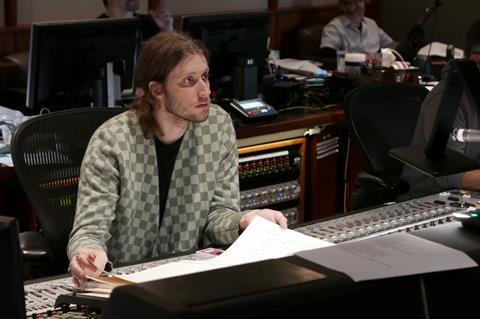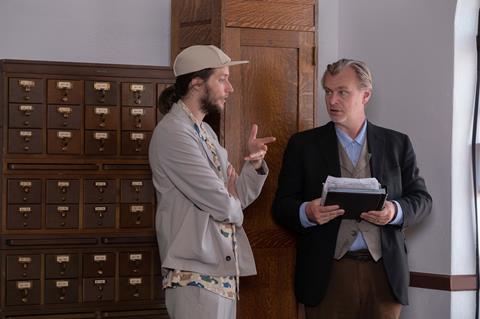Ludwig Göransson’s high-impact score for Oppenheimer helped turbocharge the biographical drama into a $952m blockbuster hit. Screen talks to the Oscar winner about his journey into sound.

Given his parents named him after one of the greatest composers of all time, it is perhaps no surprise that Ludwig Göransson became a musician. Born in Sweden in 1984, the Oscar-winning composer of Black Panther, Tenet and Oppenheimer received his first guitar aged six. “My dad and I sat down every day for 10 minutes to play; it became my alone time with him, a way for us to bond. Then, when I was nine, I really discovered music. I heard Metallica, and thought, ‘Okay, I want to do this for the rest of my life.’”
At 15, Göransson was of one of three from his high school to compose a five-minute piece for a professional orchestra. “I was listening to a lot of film scores, a lot of John Williams, [Danny Elfman’s] The Nightmare Before Christmas and Edward Scissorhands,” he recalls. “The piece I wrote was inspired by John Williams.” Göransson heard it performed by a 70-piece orchestra and was overwhelmed, becoming obsessed with having those feelings again. “I realised the only way would be film scoring. But the films that demanded those feelings were maybe not made in Sweden. It was films made in Hollywood.”
First, Göransson studied guitar at Stockholm’s Royal College of Music, then film and TV composition at the University of Southern California, where he met Ryan Coogler and scored his student films. (“I knew right away how talented he was,” says the composer.) On graduating, Göransson spent the next few years assisting The Devil Wears Prada composer Theodore Shapiro, before getting his big break with TV’s Community, working on the show for six seasons. “Every episode was different. I got to record with an orchestra, I got to do Star Wars music, a Lord Of The Rings spoof. It was great training.”
The show also led to Göransson’s involvement as writer and producer for Community star Donald Glover’s music project Childish Gambino.
In 2013, Coogler asked the composer to score his debut feature Fruitvale Station, a first for both men, which subsequently led to the pair collaborating on Creed, then Marvel blockbuster Black Panther, which won Göransson the Oscar for best original score. Meanwhile, Christopher Nolan was looking for a composer for his inverted thriller Tenet and, being a fan of the Creed score, called the Swede. The partnership proved fruitful, so Nolan turned to Göransson once again when starting work on his next project.
Musical first

Nolan’s script for Oppenheimer — a three-hour biographical drama about the man who led the development of the atomic bomb — was, famously, written in the first person. “That was something I hadn’t experienced before,” Göransson says. “The music needs to put the audience in his shoes. You want to feel what he feels, see what he sees. Not to sit there and judge him. And Chris gave me one idea — to use the violin to portray Oppenheimer’s personality.”
Why the violin? “It’s a fretless instrument, so by changing the vibrato, changing the bowing, you can go from a beautiful, calm, romantic tone to something incredibly neurotic within a split second,” explains Göransson, who also scored Pixar’s Turning Red and Star Wars spin-off The Mandalorian. “It can speak for so many feelings. It can pull your heartstrings or make your blood boil or make your blood ice cold. In general, violins are used in horror or thrillers. But what if instead of playing it with a screechy cluster, you make it soft and work with a vibrato?”
Göransson’s wife Serena McKinney is an accomplished violinist, so he started recording with her in the studio, “trying to come up with an interesting sonic landscape. But I realised the only way to start my work on this movie was to focus on the emotional core of the character.” Göransson got a three-note melody stuck in his head, “a very simple bassline”, and recorded it on the keyboard. “Then the top melody showed up in my head and I had Serena record it. The way she performed it — very intimate, you could almost hear her breaths in the microphone — really moved me. I sent that to Chris. He called straight away and said, ‘We’ve got something here.’”
At that stage, Göransson — who lives with his wife and two sons in Los Angeles — was working from his “memories of the script” but he was soon intimately involved in Nolan’s filmmaking process. “I sit in production meetings. They invited me to see visual-effects tests in an Imax theatre. No sound, just these incredibly visual experiments that had a very powerful impact on me. Also, close-ups of Cillian Murphy’s face, the clothes he’s going to wear, to see how it’s going to feel. That gives me a lot of inspiration. Every week I’m writing music, and I meet with Chris, and we talk. I do about two hours of music before we start shooting. I also visit the set. I’m constantly involved, hearing and seeing things.”
While Oppenheimer has his violin theme, for US Atomic Energy Commission chairman Lewis Strauss (played by Robert Downey Jr), the film’s ultimate antagonist, Göransson decided on a harp — “to have a sense of mystery to this character” — while Oppenheimer’s wife Kitty (Emily Blunt) is represented by the piano. “She’s the person that keeps him grounded. She’s the most powerful person in his life. Her theme is based on 12 piano chords with long pauses in between, so you can really feel it, because a lot of her scenes have this tension to them.”
Once Nolan and editor Jennifer Lame began cutting the film, they incorporated the music already written, because “Chris doesn’t use temp music”, Göransson says. “A lot of it works, some doesn’t. I go through every cue after we have a cut.” For the third-act congressional hearing involving Strauss, Nolan asked for music with a lot of tension. “We scored that like an action film. Chris asked me to write a 25-minute propulsive piece of music. Chris and Jen cut it into that scene, then because they’ve cut it down to 15 minutes, I rewrite and redo it.”
When it came time to record the score, Göransson used the Hollywood Symphony Orchestra’s 46-piece string section “because of the humanity” involved; he estimates 70%‑80% of the music in the finished film is performed by live musicians. “Having that group in a room, the individuality of the players, the conductor, bringing that music to life, had a huge impact on how it came out,” he explains. “We could exaggerate some pieces or bring the dynamic up and down and make it even more suspenseful or emotional. It’s all very organic even though, at times, I’m using modern elements like synthesisers or production.”
In addition, Göransson’s score incorporates sound effects, notably foot stomps. “[Nolan] sent me those and I incorporated them into the music. The most prominent is where Strauss gets the most upset and it cuts back to Oppenheimer in the interrogation room and the wall turns bright. I used some to heighten that moment.”
Oppenheimer was released in July via Universal Pictures, connecting with cinema audiences worldwide to the tune of a $952m box office, and landing Göransson a place on the Oscar shortlist and Bafta longlist for best original score. After working back-to-back on two “very heavy projects” — before Oppenheimer was Black Panther sequel Wakanda Forever — Göransson is treating himself to a well-earned rest.
“I’ve been working for 15 years, and it’s always been ‘onto the next,’” he admits. “I’m taking some time to reflect and recharge. I feel fortunate I’m able to work with people I feel are true artists and make things I care about, and I want to continue that journey.”

























No comments yet